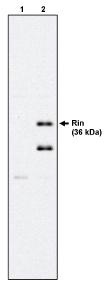Catalogue

Mouse anti Human Rin
Catalog number: X1187M| Clone | 27G2 |
| Isotype | IgG2b |
| Product Type |
Monoclonal Antibody |
| Units | 100 µg |
| Host | Mouse |
| Species Reactivity |
Human Mouse |
| Application |
Western Blotting |
Background
Rit and its neuron-specific homologue, Rin, define a recently discovered subfamily of Ras-related GTPases. Rit and Rin are membrane-associated in spite of the fact that they lack a CAAX box or similar C-terminal lipidation motif. Rit and Rin display 64% amino acid sequence identity and share a unique nine amino acid effector domain (DPTIEDAYK) that is 100% conserved between the murine and human proteins. Although the effector domain sequences of Rit and Rin are very similar to that of Ras, Rit and Rin have been shown to interact with the known Ras-binding proteins RalGDS, Rlf and AF-6, but not the Raf kinases, RIN1 or the p110 subunit of PI3 kinase. For this reason, it has been suggested that Rit and Rin may play important roles in the regulation of signaling pathways distinct from those controlled by Ras.
Source
Immunogen: Hybridoma produced by the fusion of splenocytes from mice immunized with full-length recombinant human Rin protein and mouse myeloma cells.
Product
Product Form: Unconjugated
Formulation: Provided as sterile filtered solution containing 20 mM sodium phosphate, 150 mM sodium chloride, 50% glycerol at pH 7.5 and 3 mM sodium azide
Concentration: See vial for concentration
Applications
Antibody detects recombinant Rin protein expressed in 293 cells by Western blot analysis at a concentration of 0.5 to 1 µg/ml. Does not cross-react with Rit protein. Optimal concentration should be evaluated by serial dilutions.
Functional Analysis: Western Blotting
Storage
Product should be stored at -20°C. Aliquot to avoid freeze/thaw cycles
Product Stability: See expiration date on vial
Shipping Conditions: Ship at ambient temperature, freeze upon arrival
Caution
This product is intended FOR RESEARCH USE ONLY, and FOR TESTS IN VITRO, not for use in diagnostic or therapeutic procedures involving humans or animals. It may contain hazardous ingredients. Please refer to the Safety Data Sheets (SDS) for additional information and proper handling procedures. Dispose product remainders according to local regulations.This datasheet is as accurate as reasonably achievable, but Nordic-MUbio accepts no liability for any inaccuracies or omissions in this information.
References
1. Rusyn, E.V., et al. Rit, a non-lipid-modified Ras-related protein, transforms NIH3T3 cells without activating the ERK, JNK, p38 MAPK or PI3K/Akt pathways. Oncogene 2000, 19, 4685-4694.
2. Lee, C.H. et al. Rin, a neuron-specific and calmodulin-binding small G-protein, and Rit define a novel subfamily of ras proteins. J. Neurosci. 1996, 16, 6784-6794.
3. Shao, H., et al. Biochemical characterization of the Ras-related GTPases Rit and Rin. Arch. Biochem. Biophys. 1999, 371, 207-219.
Protein Reference(s)
Database Name: SwissProt
Accession Number: Q13671
Species Accession: Human
Safety Datasheet(s) for this product:
| NM_Sodium Azide |
| NM_Glycerol |

|
" Western blot analysis using Rin antibody (Cat. No. X1187M) on 293 cells expressing HA-tagged Rit (1) and HA-tagged Rin (2)." |

" Western blot analysis using Rin antibody (Cat. No. X1187M) on 293 cells expressing HA-tagged Rit (1) and HA-tagged Rin (2)."
